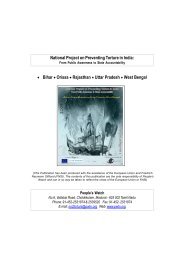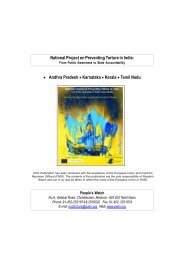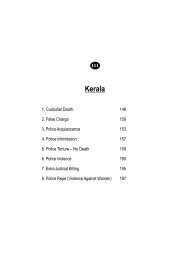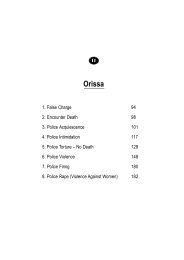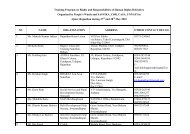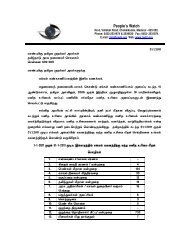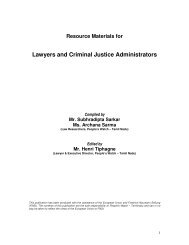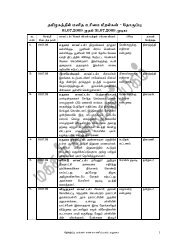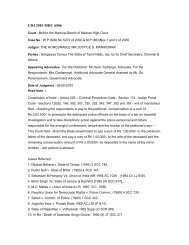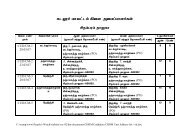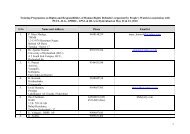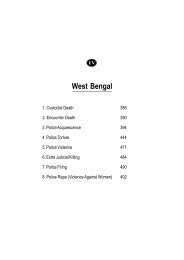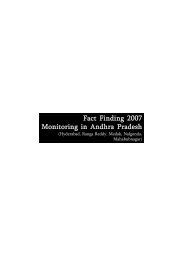PW-TN Tsunami repsonse.pdf - People's watch
PW-TN Tsunami repsonse.pdf - People's watch
PW-TN Tsunami repsonse.pdf - People's watch
Create successful ePaper yourself
Turn your PDF publications into a flip-book with our unique Google optimized e-Paper software.
PEOPLE’S WATCH-TAMILNADU– TAMIL<br />
NADU<br />
TSUNAMI RESPONSE<br />
LAST UPDATE ON 26.9.05<br />
M.LOUIS<br />
SPECIAL COORDINATOR<br />
PEOPLE’S WATCH-TAMILNADU<br />
6, Vallabai Road<br />
Chokkikulam<br />
Madurai – 625 010<br />
Phone: +91 452 253 95 20<br />
Fax: +91 452 253 18 74<br />
E-mail: louis@pwtn.org, info@pwtn.org<br />
Web: www.pwtn.org<br />
1
I. BACKGROUND<br />
People’s Watch-Tamilnadu is a human rights organization based in the city of Madurai,<br />
India. People’s Watch-Tamilnadu has been active in <strong>Tsunami</strong> related activities since the<br />
afternoon of December 26 th , specifically in three topic areas: relief, rehabilitation and<br />
rehabilitation monitoring, and leadership of the <strong>Tsunami</strong> Relief and Rehabilitation<br />
Coordination – Tamil Nadu and Pondicherry (TRRC), a consortium of more than 250 local<br />
NGOs.<br />
The question must be asked why People’s Watch-Tamilnadu decided to partake in all three of<br />
the activities mentioned above, when its focus is on the monitoring of human rights. The<br />
answer can be found in the argument that in order to discuss human rights and the monitoring<br />
of human rights one must first ensure “humanity”, and in order to ensure “humanity” one<br />
must offer relief and address violations of human rights in the provision of relief. Thus, the<br />
driving force behind People’s Watch-Tamilnadu <strong>Tsunami</strong> related activities has been to<br />
support those in need, who have actively or inactively been discriminated or excluded from<br />
relief. People’s Watch-Tamilnadu has been very active in the identification of those who have<br />
not received relief and those who are having their rights abused, while addressing special<br />
needs that have been overlooked by other players.<br />
Moreover, according to the National Campaign for Dalit Human Rights (NCDHR) several<br />
instances of discrimination had already occurred: in relief camps Dalits were housed<br />
separately and food packets were distributed separately, while food and clothing were given<br />
in a discriminatory manner.<br />
Although People’s Watch-Tamilnadu had no previous experience in rehabilitation and<br />
rehabilitation monitoring it made a decision to support rehabilitation efforts. This decision<br />
was based on the fact that People’s Watch-Tamilnadu does possess the required infrastructure<br />
and knowledge: a vast network of active NGOs and partners in the field and the “know how”<br />
of human rights monitoring. At the same time People’s Watch-Tamilnadu experience,<br />
leadership and infrastructure in the areas hit by the <strong>Tsunami</strong> led to the decision to accept an<br />
active role in the formation of the TRRC and in its related activities.<br />
All these became possible with the leadership and coordination of Mr. M. Louis, who has<br />
joined <strong>PW</strong>-<strong>TN</strong> just before 3 months to <strong>Tsunami</strong>. Mr. Louis is a development professional<br />
who was absorbed by <strong>PW</strong>-<strong>TN</strong> to lead its south Asia regional program on “Right to<br />
Sustainable Livelihood and enabling of Social and Political rights”, a project initiated by the<br />
Sri Lanka based Consortium of Humanitarian Agencies. For his proven abilities within <strong>PW</strong>-<br />
<strong>TN</strong> and the earlier track record, he was assigned to be the Special coordinator for all of<br />
<strong>Tsunami</strong> Relief and rehabilitation activities and the research program of People’s Watch-<br />
Tamilnadu, through out Tamilnadu & Pondicherry, without whom otherwise; <strong>PW</strong>-<strong>TN</strong> could<br />
not have carried out so much of activities. In addition, he also coordinates the activities of<br />
TRRC in Tamilnadu & Pondicherry.<br />
2
II. OVERVIEW<br />
The intention of this document is to provide a review of the various <strong>Tsunami</strong> related activities<br />
People’s Watch-Tamilnadu has initiated. These activities include the following:<br />
1. Emergency Relief<br />
Provision of emergency relief to 18,961 families benefiting approximately 1,00,000<br />
persons in Kannyakumari, Thirunelveli, Thoothukudi, Karaikkal, Cuddalore, and<br />
Kanchipuram districts.<br />
2. Temporary Shelters<br />
The construction of temporary shelters benefiting approximately 1,500 families in<br />
Kanyakumari, Thoothukudi, and Kancheepuram districts<br />
3. Drinking Water Restoration<br />
Assistance in drinking water restoration benefiting approximately 1,500 families in<br />
Kancheepuram district<br />
4. Educational Assistance<br />
Educational assistance benefiting approximately 2,000 school children, 150 polytechnic<br />
students, and 300 college girls in Kanyakumari and Cuddalore districts<br />
5. Campus Renovation<br />
Assistance to five schools indirectly benefiting approximately 1,500 school children in<br />
Kanyakumari district<br />
6. Livelihood Reconstruction<br />
Financial assistance for manufacturing of 5 fiber boats and appropriate fishing nets have<br />
been provided to the fishing community in Kameshwaram village of Nagapattinam<br />
district, on an agreement that these will be used as common property of the entire village.<br />
Also, <strong>PW</strong>-<strong>TN</strong> has been implementing a livelihood rehabilitation program for the nonocean<br />
fishing communities, who happened to be dalits in 5 villages of Thoothukudi<br />
district and 17 villages of Kancheepuram district. This program adopts the ‘Community<br />
Fund” model which facilitates optimal participation of the target communities and<br />
owning the efforts. The same model will be expanded to another 28 villages in<br />
Kancheepuram district shortly.<br />
7. Studies and Reports<br />
Have undertaken the following research studies:<br />
• Rapid Impact Assessment Study<br />
• Profiling of Orphan Children and Widows<br />
3
• Study on Discrimination and Exclusion in State Relief<br />
• Study to understand Peoples’ perceptions on G.O. 172<br />
• Study to assess the Vulnerabilities and Livelihood security options of the nonocean<br />
fishing communities affected by <strong>Tsunami</strong> in Tamilnadu<br />
• Study on, “Housing Reconstruction; People Vs NGOs; Contemporary issues” (on<br />
going)<br />
8. <strong>Tsunami</strong> Relief and Rehabilitation Coordination (TRRC)<br />
Active involvement in the promotion and functioning of TRRC – a state level<br />
coordination of more than 250 NGOs<br />
9. <strong>Tsunami</strong> – Legal Action Committee (TLAC)<br />
Initiated the <strong>Tsunami</strong> legal aid program named as ‘TLAC’ covering all of the 13 costal<br />
districts<br />
10. Psycho-Social Counseling for Children<br />
Initiated a psycho-social counseling program for the children in Kanyakumari involving<br />
teachers & schools from the Institute of Human Rights Education<br />
III. ACTIVITIES<br />
1. Emergency Relief<br />
On December 26 th People’s Watch-Tamilnadu office in Madurai was closed for the holiday<br />
season. Nevertheless, several team members were in the office while others happened to be<br />
holidaying in the coastal areas. As news of the <strong>Tsunami</strong> poured in, fourteen teams were<br />
rapidly assembled to visit the field, observe the damages, and assess the situation. Reports of<br />
the findings were immediately sent to People’s Watch-Tamilnadu.<br />
Based on the findings from December 27 th and 28 th People’s Watch-Tamilnadu allocated<br />
funds to purchase food items and bed sheets, and assembled family kits valued at Rs. 2,500<br />
each for immediate relief. These family kits were then distributed to those in need. People’s<br />
Watch-Tamilnadu also purchased and distributed rice and clothes. In addition, People’s<br />
Watch-Tamilnadu staff joined the efforts of helping people reach relief camps, arranging<br />
medical assistance, securing safe drinking water, and providing informal counseling and<br />
moral support to the people in the relief camps.<br />
On January 2 nd People’s Watch-Tamilnadu offices reopened and the question of how<br />
People’s Watch-Tamilnadu should proceed was discussed. People’s Watch-Tamilnadu<br />
decided to partake in both relief and rehabilitation efforts in an organized fashion. Seeking<br />
financial support People’s Watch-Tamilnadu approached its existing donors, who agreed to<br />
contribute and support the <strong>Tsunami</strong> relief efforts, thus officially giving a green light to the<br />
relief activities.<br />
People’s Watch-Tamilnadu contacted local NGOs in all six worst affected districts and<br />
requested that these NGOs identify people who had not received the Government relief aid.<br />
Government relief was distributed only to those who possessed a family card, excluding all<br />
4
those who did not have a card. Because Government policy is such that family cards are<br />
issued only once in five years many young families do not have family cards.<br />
All those identified by the NGOs were contacted and relief packages were distributed to them<br />
based on their needs. These packages included essential items such as rice, utensils, clothes,<br />
etc and were valued at Rs. 3,000-5,000 each. Relief materials were purchased by People’s<br />
Watch-Tamilnadu to ensure identical quality, and packed by volunteers in the Madurai office.<br />
In order to avoid confusion lists of eligible people were created and tokens were given to<br />
them as a means of identification. Local NGOs initiated the distribution activities on January<br />
6 th , efforts which lasted throughout the duration of the month. Because Nagapattinam was the<br />
worst hit area and it received most of the international aid attention, People’s Watch-<br />
Tamilnadu decided to focus its efforts in other districts. Although Karaikkal district was not<br />
recognized as a <strong>Tsunami</strong>-affected district People’s Watch-Tamilnadu decided to expand its<br />
relief activities and incorporate Karaikkal based on its large Dalit population.<br />
In total People’s Watch-Tamilnadu provided emergency relief to 18,961 families benefiting<br />
approximately 1,00,000 persons in Kannyakumari, Thirunelveli, Thoothukudi, Karaikkal,<br />
Cuddalore, and Kanchipuram districts.<br />
Relief work in the office…<br />
5
… and in the field<br />
7
2. Temporary Shelters<br />
People’s Watch-Tamilnadu was the first organization that supported NGOs in the<br />
construction of temporary shelters. Although People’s Watch-Tamilnadu was not directly<br />
involved in the construction of the temporary shelters it provided local NGOs with the funds<br />
to do so. People’s Watch-Tamilnadu emphasized the need to incorporate local knowledge and<br />
preferences when constructing the shelters: the direction in which a shelter faces, sanitation,<br />
the materials used in its construction, and the location of homes in relation to the sea, are all<br />
crucial aspects of effective housing rehabilitation. The TRRC advocates the use of ownerdriven<br />
construction techniques, where each family is instrumental in the rebuilding of its<br />
home, in recognition that this is one step toward rebuilding a way of life shaken by the<br />
<strong>Tsunami</strong>.<br />
In total, People’s Watch-Tamilnadu provided financial support to local NGOs for the<br />
construction of an estimated 1,500 temporary shelters in Kanyakumari, Thoothukudi, and<br />
Kancheepuram districts.<br />
8
In addition, from January to March 2005, People’s Watch-Tamilnadu monitored the<br />
Government led rehabilitation activities. These rehabilitation monitoring activities consisted<br />
of bi-weekly visits to all affected costal villages from Kanyakumari to Kollamcode (on the<br />
Kerala border). In many cases People’s Watch-Tamilnadu identified that many temporary<br />
shelters were not constructed according to standards, that electricity and running water were<br />
not available, and that sanitation facilities were not in place. Moreover, the construction<br />
materials of many temporary shelters are inappropriate to the current weather conditions, i.e.<br />
shelters are extremely hot and cannot withstand even four hours of consecutive rain. People’s<br />
Watch-Tamilnadu has expressed the need to ensure that temporary shelter construction<br />
follows specific regulations regarding safety, durability, and size.<br />
Temporary shelters<br />
9
3. Drinking Water Restoration<br />
Periyanemmeli Panchayat in Kancheepuram district has a population of 1,500 families that<br />
were affected by the <strong>Tsunami</strong>. Their primary source of livelihood is inland and backwater<br />
fishing – both which were affected by the <strong>Tsunami</strong>. Besides the the Panchayat well the only<br />
source of drinking water was filled with sand by the <strong>Tsunami</strong>. This well crisis has left the<br />
people in Panchayat searching for drinking water.<br />
During a People’s Watch-Tamilnadu visit to Panchayat, representatives from this community<br />
had discussed the issue with the People’s Watch-Tamilnadu staff and People’s Watch-<br />
Tamilnadu immediately agreed to provide the funding required deepening and expanding the<br />
well. The complete project is estimated to cost a total of Rs. 450,000. People’s Watch-<br />
Tamilnadu contributed Rs. 100,000, while other sources contributed Rs. 250,000, the people<br />
themselves contributed a total of Rs. 50,000, and the remaining Rs. 50,000 were received in<br />
sweat equity. The work on the well is currently in progress and is scheduled to be completed<br />
by the end of March.<br />
4. Educational Assistance<br />
People’s Watch-Tamilnadu has provided ongoing support to school children and students by<br />
purchasing school books and uniforms, advocating for special consideration of those affected<br />
by the <strong>Tsunami</strong>, and identifying students who did not receive government funding for school<br />
supplies.<br />
Kanyakumari district provides two examples of People’s Watch-Tamilnadu educational<br />
assistance activities. People’s Watch-Tamilnadu- agreed to fund a proposal for students in the<br />
Polytechnic from Nagarcoil City. The Polytechnic faculty had identified 56 students most in<br />
need, and submitted a proposal to assist these students. This proposal included the<br />
distribution of food materials, bus charges, tuition fees, and exam fees. In another college in<br />
Nagarcoil City People’s Watch-Tamilnadugave two full sets of clothes to 120 children.<br />
In total People’s Watch-Tamilnadu has benefited approximately 2,000 school children, 150<br />
polytechnic students, and 300 college girls in Kanyakumari and Cuddalore districts.<br />
10
Educational assistance<br />
5. Campus Renovation<br />
In the aftermath of the <strong>Tsunami</strong> dead bodies were placed in nearby schools. Once the bodies<br />
were removed <strong>Tsunami</strong> survivors were asked to reside in the schools for the duration of one<br />
month while the temporary shelters were being constructed. By the middle of February<br />
classed had resumed in all these schools however their physical condition was not very good.<br />
Five of the missionary schools wrote a proposal to get the schools repainted and submitted<br />
their proposal to People’s Watch-Tamilnadu. People’s Watch-Tamilnadu agreed to fund the<br />
project. The painting was initiated in the beginning of March and was completed by the end<br />
of March.<br />
This funding for campus renovation of six schools indirectly benefited approximately 1,500<br />
school children in Kanyakumari district.<br />
Names of the schools benefited;<br />
1. St. Francis Primary & High school, Nagercoil<br />
2. St.Antony’s Higher Secondary school, Kanyakumari<br />
3. St. Jude Thaddaeus Primary & Higher Secondary School, Pallam<br />
11
4. All Saints Primary Schools, Muttom<br />
5. St. Mary’s Higher Secondary school, Colachel<br />
6. St. Thomas Primary & Nursery school, Chinnamuttom<br />
6. Livelihood Reconstruction<br />
For reasons of many Organizations expressing willingness to help in providing boats and<br />
kattamarans for the fishing communities and for the complexity attached with this activity,<br />
People’s Watch-tamilnadu has decided not to venture into this, instead wanting to focus on<br />
rebuilding the livelihoods of the marginalized and vulnerable communities. However, since a<br />
unique proposal has come from the fishermen of Kameshwaram village, Nagapattinam<br />
district, <strong>PW</strong>-<strong>TN</strong> processed it further. The fishermen from this village asked only for 5 boats<br />
that would be sufficient for them to restore their livelihoods, if they use them collectively.<br />
<strong>PW</strong>-<strong>TN</strong> thought that this type of collective approach should be encouraged, so that it<br />
provides a model for the rest. Boats manufactured on this arrangement were handed over to<br />
the community on 13 March 2005.<br />
Also, <strong>PW</strong>-<strong>TN</strong> has been implementing a livelihood rehabilitation program for the nonocean<br />
fishing communities, who happened to be dalits in 5 villages of Thoothukudi<br />
district and 17 villages of Kancheepuram district. This program adopts the ‘Community<br />
Fund” model which facilitates optimal participation of the target communities and<br />
12
owning the efforts. The same model will be expanded to another 28 villages in<br />
Kancheepuram district shortly.<br />
7. Studies and Reports<br />
<strong>PW</strong>-<strong>TN</strong> on behalf of TRRC has completed the following three studies and respective reports:<br />
• Rapid Impact Assessment Study<br />
This study was conducted on January 5 th and 6 th in nine coastal districts. A total of<br />
262 villages were surveyed covering almost 170,000 families and 680,000 people.<br />
The study objective was to examine the impact of the <strong>Tsunami</strong> on the lives of the<br />
affected communities with a focus on material goods lost.<br />
This study was designed and carried out by the TRRC. A draft report was released on<br />
January 10 th at Trichy during the TRRC State Coordination Meeting and provided a<br />
baseline for TRRC’s planning of relief and rehabilitation activities.<br />
Selected results are presented below:<br />
o More than 10,000 people had died and an estimated 9,000 people were seriously<br />
injured<br />
o Of the three districts Nagapattinam was the worst affected with almost 4% of the<br />
population assumed dead<br />
o More women (and children) lost their lives in the <strong>Tsunami</strong> when compared with<br />
men<br />
o More than 88,000 houses and 65,000 boats or catamarans were lost; domestic<br />
property was lost in more than 31,000 houses.<br />
o All four zones greatly depend on fishing as their main source of livelihood<br />
• Profiling of Orphan Children and Widows<br />
This study was conducted between January 15 th and 24 th in three coastal districts -<br />
Cuddalore, Kanyakumari, and Nagapattinam – and covered a total of 89 villages. The<br />
study objective was to profile the widows and orphans in the <strong>Tsunami</strong>-affected areas.<br />
Selected results are presented below:<br />
o A total of 3,769 widows and 377 orphans were identified<br />
o All three districts had a relatively high number of widows and orphans prior to the<br />
<strong>Tsunami</strong> (3,350 and 297 respectively)<br />
o Most of the new widows were identified in Nagapattinam<br />
13
o Widows who did not receive government compensation were more commonly<br />
found in Cuddalore and Kanyakumari<br />
o Religion did not seem to play a role in the distribution of relief<br />
o There is a possibility that pre-<strong>Tsunami</strong> widows have been discriminated against<br />
and as such have not received relief<br />
o The local communities have mechanisms in place to care for the widows and the<br />
orphans<br />
The report concluded that compensation provided to widows and orphans should be<br />
monitored in addition to the wellbeing of orphans.<br />
• Study on Discrimination and Exclusion in State Relief<br />
This study was conducted between February 7 th and 13 th in selected villages in the<br />
nine coastal districts surveyed in the January Rapid Impact Assessment. The study<br />
objective was to identify people and communities discriminated against or excluded<br />
from state relief and submit this list to the Government for re-consideration.<br />
Selected results are presented below:<br />
o A total of 7,797 people were eligible for relief but were discriminated or excluded<br />
from relief<br />
o Most of those identified (47%) were from Kancheepuram district<br />
o Caste based discrimination was the most common, followed by occupation and<br />
religion based discrimination<br />
8. <strong>Tsunami</strong> Relief and Rehabilitation Coordination (TRRC)<br />
(An exclusive report on TRRC is available, on request)<br />
The <strong>Tsunami</strong> Relief and Rehabilitation Coordination – Tamil Nadu and Pondicherry (TRRC)<br />
– was first conceptualized on December 31 st , 2004 and established on January 3 rd , 2005. The<br />
TRRC began as the collaborative effort of some 90 individuals, and has now expanded to<br />
incorporate more than 250 NGOs.<br />
During its conception Mr. Henri Tiphagne was approached by other activists and personally<br />
asked to provide his leadership as TRRC State Convenor as well as People’s Watch-<br />
Tamilnadu professional support to TRRC activities. People’s Watch-Tamilnadu was among<br />
the very few NGOs that had immediate access to the affected communities through its local<br />
network of NGOs. As People’s Watch-Tamilnadu had already engaged in some relief<br />
activities and collaborated with its partners it felt that the TRRC was indeed the need of the<br />
hour without which the affected communities would not receive access to available resources<br />
14
in time. The final decision to join TRRC was made in People’s Watch-Tamilnadu office,<br />
Madurai.<br />
The purpose of TRRC is to organize state level consultations on state-civil society<br />
partnership, monitoring of human rights, and the status of <strong>Tsunami</strong>-affected children. Its<br />
three main objectives are to coordinate the relief stage of the work, coordinate the immediate<br />
and long term rehabilitation efforts, and monitor the efforts of the Government in this regard.<br />
Community participation is a key consideration as is the responsibility to communicate the<br />
views and the demands of the communities to the Government. The Gujarat experience has<br />
encouraged TRRC to strongly promote information sharing and coordination as essential for<br />
effective and efficient relief and rehabilitation.<br />
Given its history, priorities, and broad-based membership, the TRRC performs needs<br />
assessment, monitoring, and policy advocacy in a variety of sectors that include children,<br />
women, Dalit, Adivasi, and minority concerns; health, trauma counseling, and community<br />
support systems; direct relief, housing, and capacity-building; livelihood rehabilitation; and<br />
resource-monitoring and environmental impact studies.<br />
To date TRRC has led five state level consultations and initiated many <strong>Tsunami</strong>-related<br />
studies, three of which were discussed earlier in this report. Altogether, TRRC’s outlook and<br />
activities have been deliberately framed to provide not only the necessities of life, but also<br />
what is required in order to begin rehabilitation and move away from relief.<br />
The TRRC secretariat is located in People’s Watch-Tamilnadu, and small, field offices, have<br />
been established in cooperation with local NGOs. The secretariat not only coordinates all of<br />
the TRRC activities but also acts as a center where most of the volunteers and other visitors<br />
and researchers come and receive updates on the events and the immediate needs of the<br />
different villages. Moreover, the TRRC website is an integral part of the People’s Watch-<br />
Tamilnadu website.<br />
TRRC has established a productive working relationship with its local partners and<br />
communicates with them on a weekly basis. Additional, ongoing activities include<br />
conducting meetings with the District Collector, and the distribution of notices, invitations for<br />
meetings, and newsletters.<br />
TRRC intends to continue its work in monitoring relief and rehabilitation work, research, and<br />
policy advocacy related to the rehabilitation process. Finally, the TRRC will work to<br />
strengthen community-based reconstruction efforts.<br />
15
TRRC meetings<br />
16
9. <strong>Tsunami</strong> – Legal Action Committee (TLAC)<br />
By the middle of January many <strong>Tsunami</strong> affected people had not yet received relief.<br />
Moreover, experience has shown that many groups who were eligible for relief and<br />
rehabilitation fail to receive appropriate support. Many human rights organizations,<br />
including People’s Watch-Tamilnadu, felt that the Government holds the responsibility to<br />
compensate these people and as such identified the need for a policy level, legal aid<br />
intervention that would reach out to those affected in all 13 coastal districts.<br />
On February 6 th People’s Watch-Tamilnadu organized a meeting in Madurai to discuss<br />
different courses of action on the district level and propose a comprehensive course of action<br />
for state level intervention. JANVIKAS, a sister organization from Gujarat state which was<br />
very active during the Gujarat earthquake, was glad to share its experiences with People’s<br />
Watch-Tamilnadu and sent its representatives to the meeting. Other NGOs, including TRRC,<br />
also participated. The meeting resulted in the establishment of the <strong>Tsunami</strong> – Legal Action<br />
Committee (TLAC) as a partnership of three key organizations: Human Rights Law Network<br />
(Chennai), the Society for Community Organization (SOCO) Trust (Madurai), and People’s<br />
Watch-Tamilnadu. (It was decided that TLAC would be based in People’s Watch-Tamilnadu.<br />
Recruitment the TLAC staff was completed by the end of February followed by an initial 2-<br />
day workshop to integrate the diverse group of young lawyers, experienced judges and<br />
students. It was determined that the headquarters and secretary would be in People’s Watch-<br />
Tamilnadu, Madurai, with four zonal offices in Chennai, Caddalore, Kanyakumari, and<br />
Naggapatinam.<br />
TLAC felt a strong need that complaints be received from the affected people in local settings<br />
and that claims be settled immediately. Public litigation and court hearing would be chosen as<br />
a course of action at times when the state would be unwilling to cooperate. In addition, TLAC<br />
will try to highlight areas that the Government has failed to address.<br />
TLAC began its field activities on March 7 th when local NGOs were contacted and the worsthit<br />
villages were identified. Using publicity and propaganda people were informed of the<br />
legal activities and the opportunity to submit their claim. Field camps open for the duration of<br />
30 days were established in villages, with each camp covering up to 10 villages from the<br />
surrounding area. After receiving the complaint TLAC recesses and classifies them, and an<br />
action is initiated within 10 days. At the present time complaints are being received and<br />
addressed on a rolling basis; to-date TLAC has received more than 10,000 complains from all<br />
four zones.<br />
Although different areas will emerge as TLAC progresses with its work several needs have<br />
already been identified:<br />
• The need to assist people in filing a First Information Report (FIR) for missing people.<br />
• There has been a problem in providing compensation to families of missing persons as by<br />
Government Order (GO) compensation can be received only if the family has been<br />
successful in identifying the body.<br />
• Although there have been numerous GOs they do not cover all affected populations, such<br />
as widows.<br />
17
• While in theory GOs defined many people as eligible for compensation, in practice lists<br />
of those eligible were incomplete and many did not receive relief funds.<br />
• People have been asked to pay for their electricity bills when they don’t even have<br />
enough food to eat.<br />
• In order to be eligible for health benefits people must provide evidence of hospitalization<br />
for at least 7 consecutive days, however even if the injury was severe in reality most<br />
people were discharged after only 3 days and as such are not eligible.<br />
• The forced eviction of coastal communities’ inland, especially around Chennai, in the<br />
name of safety (i.e. the possibility of a recurring <strong>Tsunami</strong>).<br />
TLAC 2-day workshop<br />
18
10. Psycho-Social Counseling for Children (primary level)<br />
After the <strong>Tsunami</strong>, children from affected areas were identified to be in distress due to the<br />
<strong>Tsunami</strong>. Children were affected at various levels, but in general demonstrated one of the<br />
following three groups of symptoms:<br />
• Those in a state of shock, not reacting and/or speaking<br />
• Those who reacted in an outburst when talking about the sea; spoke loudly and<br />
harshly<br />
• Those who were always crying<br />
In January People’s Watch-Tamilnadu decided to conduct a training on 27.01.2005 for<br />
teachers to enable them to address the special needs of these children. The training was<br />
announced in various schools in both <strong>Tsunami</strong>-affected and non-affected areas, and 60<br />
teachers showed up for this training. Ms. Arthi Rajarathinam, a trained psychologist, was<br />
invited from Salem to conduct this training. As many of the teachers were themselves<br />
<strong>Tsunami</strong> victims this training was an opportunity to address their needs as well.<br />
On 09.02.2005 a core group of teachers interested in psycho-social counseling was formed<br />
with a primary aim of working with children affected by the <strong>Tsunami</strong>. Activities would<br />
include the provision of immediate psycho-social support. It was also agreed that once the<br />
work in the <strong>Tsunami</strong> affected areas will be completed, the same teachers will be given further<br />
training to become school counselors as well.<br />
The positive feedback from the activities discussed above resulted in the expansion of this<br />
psycho-social initiative. Ms. Arthi Rajarathinam conducted visits in schools throughout the<br />
region to meet and speak with the children and teachers. Sessions were conducted involving<br />
various therapy techniques, including playing games to reduce the fear of sea and disaster and<br />
empower the children.<br />
It was also decided to conduct a 10-day counseling program in the <strong>Tsunami</strong> affected areas<br />
during the holidays when the children will not have school and therefore will be more likely<br />
to slip into depression of anxiety. This counseling program will focus on seven severely<br />
affected villages and will begin on April 22 nd . A second round of training is scheduled for<br />
May 2 nd , while visits, evaluations and feedback will be conducted throughout May.<br />
The key to the initiation and success of this program is the active involvement of the<br />
teachers who have been associating with the Human Rights Education Program of<br />
People’s Watch-Tamilnadu.<br />
19
PEOPLE'S WATCH - TAMILNADU<br />
TSUNAMI - FUND POSITION AS ON 10.05.2005<br />
Sl.No. PAR<strong>TN</strong>ERS Grant received<br />
Expenses<br />
Balance<br />
1 MISEREOR 1,542,996.00 1,542,996.00 -<br />
2 DCA 13,046,720.14 11,054,530.31 1,992,189.83<br />
3 BREAD FOR THE WORLD 990,000.00 990,000.00 -<br />
4 U.U.S.C 4,358,936.00 105,451.95 4,253,484.05<br />
5 CCFD 1,140,000.00 1,140,000.00 -<br />
6 CORDAID - TRRC 425,500.00 309,902.57 115,597.43<br />
7<br />
CORDAID - RELIEF (<br />
Rs.38,84000/-)<br />
3,074,500.00 2,925,284.03 149,215.97<br />
8 FNST - RELIEF - 139,530.30 (139,530.30)<br />
9 FNST - COUNSELLING - 80,000.00 (80,000.00)<br />
10 FFIA 157,300.00 125,800.00 31,500.00<br />
11 EDM 140,000.00 - 140,000.00<br />
12 TLAC - CHRISTIAN AID 34,517.98 (34,517.98)<br />
13 TLAC - ACTION AID 500,000.00 571,074.11 (71,074.11)<br />
14<br />
TLAC - PLAN<br />
INTERNATIONAL<br />
40,104.86 (40,104.86)<br />
15 TLAC - MISEREOR 90,652.00 (90,652.00)<br />
16 TLAC - CORDAID 94,817.38 (94,817.38)<br />
TOTAL 25,375,952.14 19,244,661.49 6,131,290.65<br />
20
Grant Received for <strong>Tsunami</strong> Relief as on 17.03.2005<br />
Action Aid - TLAC, Chennai<br />
2.12%<br />
Unitarian Universalist Service Committee - <strong>Tsunami</strong><br />
11.09%<br />
Enfants Du Monde - <strong>Tsunami</strong>, Belgium<br />
0.59%<br />
Bread for the World - <strong>Tsunami</strong>, Germany<br />
4.19%<br />
Cordaid - <strong>Tsunami</strong>, The Netherlands<br />
14.83%<br />
Dan Church Aid - <strong>Tsunami</strong>, Denmark<br />
55.28%<br />
Misereor - <strong>Tsunami</strong>, Germany<br />
6.54%<br />
C.C.F.D. - <strong>Tsunami</strong>, France<br />
4.83%<br />
F.F.I.A. - <strong>Tsunami</strong>, Sw eden<br />
0.53%<br />
21



